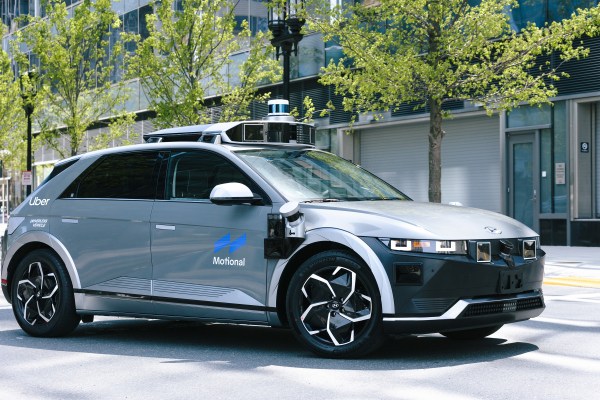Hyundai is spending close to $1 billion to keep self-driving startup Motional alive


Hyundai has agreed to spend nearly $1 billion on Motional, an investment that will give the automaker a majority stake while providing the self-driving startup with the necessary capital to keep operating.
The Korean automaker invested $475 million directly into Motional as part of a broader deal that includes buying out joint venture partner Aptiv. As part of the deal, Hyundai will spend another $448 million to buy 11% of Aptiv’s common equity interest in Motional, according to information revealed Thursday in Aptiv’s first-quarter earnings report.
Aptiv also shared that it expects to reduce its common equity interest in Motional from 50% as of March 31 to about 15%, leaving Hyundai with the remaining 85% control. Aptiv Chairman and CEO Kevin Clark flagged in January that the company would reduce its ownership interest in Motional. The company said at the time that it would stop allocating capital towards Motional due to the high cost of commercializing a robotaxi business and the long road ahead to profits.
Aptiv on Thursday reduced its full-year net sales forecast for 2024 to be between $20.85 billion and $21.45 billion, down from between $21.3 billion to $21.9 billion.
Motional confirmed the new funding round and increased stake from Hyundai. The company did not respond to TechCrunch’s inquiry regarding the accuracy of Aptiv’s figures. Hyundai could also not be reached for confirmation.
Motional started as Boston-based autonomous vehicle startup nuTonomy in 2013, before being acquired by Delphi for $400 million. Delphi would later split it’s business with the Aptiv unit absorbing nuTonomy. The entity became Motional under a $4 billion Hyundai-Aptiv joint venture in 2019. While it’s clear from Aptiv’s earnings report that the company is trying to manage risks and optimize finances amid a less positive outlook, the company’s retreat, and Hyundai’s step forward, raises questions about Motional’s future.
In March, TechCrunch reported that Motional secured a bridge loan for an undisclosed amount as a lifeline while the AV startup secured its next round of longer-term funding. While it’s likely that this funding round from Hyundai fits that bill, Motional has not responded to TechCrunch’s request for more information about whether it will need to acquire more investors in the future.
Motional has been testing its autonomous vehicles with a safety driver behind the wheel in Boston, Pittsburgh, Las Vegas, Los Angeles and Singapore. The company’s go-to-market strategy involves partnering with existing ride-hail platforms like Uber, Lyft and Via to give customers rides. Motional has stated its goal of launching a robotaxi service using driverless Hyundai Ioniq 5 vehicles in 2024.
Motional and Hyundai announced plans in November 2023 to co-develop production-ready versions of the all-electric Ioniq 5 robotaxi at the automaker’s new innovation center in Singapore, the Hyundai Motor Group Innovation Center Singapore (HMGICS). During CES 2024, Motional also announced plans to work with Kia on a next-generation vehicle that will enter commercial operations later this decade, with initial development stages beginning this year.
Motional’s financial shifts come as the robotaxi industry continues to face uncertainty. The startup has been inching slowly towards commercialization, launching pilots in at least five cities. Crucially, Motional has not yet begun charging for rides or deliveries yet. Meanwhile among the competition, Waymo continues to expand its fully driverless, paid robotaxi service in San Francisco, Los Angeles and Phoenix, with plans to hit Austin later this year. GM’s Cruise is still mainly off the streets after an incident in October 2023 that left a pedestrian stuck under and dragged by one of its robotaxis, but the company has begun mapping again in Phoenix as part of a slow, deliberate reintroduction to public roads.
Then there’s Tesla. CEO Elon Musk has shaken up his company, laying off thousands and increasing investment into AI, in a stated goal to go “balls to the walls for autonomy” and deliver a robotaxi in August.








